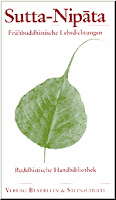Dhr. Seven, Wisdom Quarterly, based on John D. Ireland translation from Selected Texts from the Sutta Nipata (BPS Wheel 82) of "Mettagu's Question" (Snp 5.4)
At the time of the Buddha, the monk Ven. Mettagū was one of the 16 disciples of the Brahmin ascetic Bāvarī. They visited the Buddha, and he wisely used the opportunity to question him. His main question (pucchā) to the Buddha was about how various
ills originate in the world. The Buddha answered that it is through
upadhi (further definitions). At the end of this explanation, Mettagū
and his 1,000 followers attained enlightenment (SN.vss.1006, 1049 60;
SNA.ii.592).
Why does the world suffer?
Dhr. Seven; John D. Ireland translation (Snp 5.4)
[Ven. Mettagu:] "I ask the Venerable One this question that he may explain, for I know him to be a master of wisdom, a perfected being: From what is the suffering evident in the world arising?"
"Mettagu, having asked the source of suffering, so it will be explained as it has been discerned [by the Tathagata]. The many forms of suffering evident in the world arise from worldly attachments. Whoever ignorantly creates an attachment, that foolish one [ordinary uninstructed worldling] comes upon suffering again and again. Therefore, a person of understanding should not create attachment, seeing it is the source of suffering."
"Mettagu, setting forth the Dharma, a teaching to be directly perceived (ditthe dhamme: "to be seen for oneself here and now," often used of nirvana) rather than something based on hearsay, by the experience of which living mindfully one may transcend the entanglements of the world."
 |
| Buddha in the bleak (Johnkoukoulomatis.flickr) |
"Mettagu, whatever one may clearly comprehend -- above, below, across, and in between -- get rid of delight in it. [That is, let it be, abandon it, relinquish it, turn away.] Rid yourself of fixed views (habitual attitudes) and (karma-producing) consciousness. Abandon this endless continued wandering on through samsara.
"Living thus, mindful and vigilant, a meditator who has forsaken selfish attachments may, by understanding, abandon suffering, rebirth, aging, sorrow, and grief [of every kind] even in this very life."
"Living thus, mindful and vigilant, a meditator who has forsaken selfish attachments may, by understanding, abandon suffering, rebirth, aging, sorrow, and grief [of every kind] even in this very life."
[Mettagu:] "I rejoice in the words of the Great Sage. Well explained, O Gotama [Gautama], is the state of non-attachment (nirvana). The Venerable One has surely abandoned suffering, having realized this Dharma for himself. And they will certainly abandon suffering who are constantly admonished and taught by you, O Sage! Having understood, I venerate those teachings, Noble One! May the Enlightened One constantly admonish me also."
 |
| Mayhem in Thailand (2013songkran.com) |
Who was Mettagū?
According to The Apadāna (ii.342f), Mettagū generously gave out alms worth sixty crores [crore = 10 million] of gold before joining Bāvarī. Aeons before that, during the time of the Buddha Sumedha, [the being who was later reborn as] Mettagū was a wandering ascetic living near Mount Asoka in the Himalayas, in a hermitage built for him by Vissakamma. There the Buddha Sumedha visited him. The ascetic gave him a bowl filled with ghee and oil. As a result of that great merit (the karma of generosity to a fully enlightened being), he was 18 times reborn as a ruler of devas and 51 times as a king in the human realm.
THE "DISCOURSE-COLLECTION"
The Sutta-Nipata (Snp), or "Sutra-Collection," contains some of the oldest and most profound
discourses of the Buddha. The complete text has been translated into English at least
three times -- once by E.M. Hare under the
title "Woven Cadences" (Oxford University Press, London, 1945). The Pali
original consists mainly of verses interspersed with prose passages. Hare has followed this arrangement by translating it into English
blank verse. However, here the aim has been
to keep as close as possible to the original with no attempt to versify it. The first discourse shows the distinction between the mode of conduct
of the monastic and the layperson, both regarded as virtuous and good
(sadhu). For it is said: "These two ways of life are not the same, that of a householder supporting a spouse
and one freed of worldly attachments...
As a peacock never approaches the swiftness
of a swan, so a householder cannot imitate a
wandering monastic, a recluse meditating in the forest" (Snp. vv. 220-221).
 |
| The Sutra-Collection |
























































































































































































































































No comments:
Post a Comment